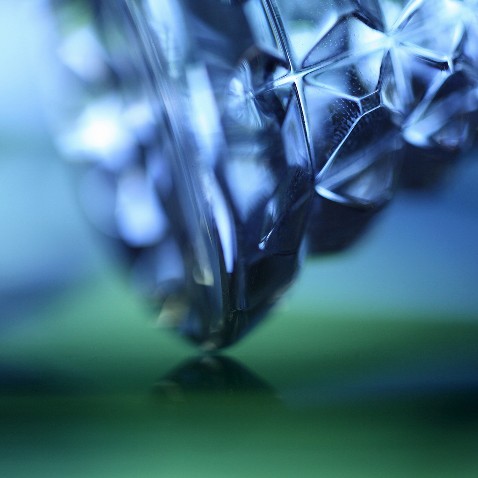lachrymatory
/ photo by Jenny Downing.
photo by Jenny Downing.
If I collected my tears in lachrymatory, placed them on dark wooden shelves, I would have a museum to missing you. Maybe no one would visit, but I would. Bottles of my weeping would line the walls, sun streaming through the windows. Fancy blown glass filled with oceans of grief, the tear bottles would refract the light, make prisms on the walls. Small beautiful points of your lack of being all around me, in every color except black, reminding me where you are not.
I quote the Bible to defend my mania. "You have noted my grief; store my tears in your flask. Are they not recorded in your book?"* David asks it of God on my behalf. Grief is sacred and should be hunted and gathered from all the dusty corners of you. Work it out of your muscles, squeeze it out of your eyes, dissect each event to find it, then catch the grief tears in delicate bottles with pewter stoppers. The Ancient Romans collected tears in jars, buried them with the dead. The Victorians poured them on the graves after their grief period ended. But I covet the tears I shed for you. Grief opened my flood gates.
Before you died, I only cried in anger. Those tears were more bitter than salty and I hated the weakness it revealed about me. When I was a girl, my father mocked crying. Even when I was very tiny, he would stand in front of me, and pretend to cry. "WAH WAH WAH. I'm so sad." He would laugh. Shamed, I would hide my face in terrible humiliation until I couldn't cry anymore.
After you died, I could not control my tears. I dreamed about oceans and seas and salt water lakes. I searched for you in the water. One minute, I was holding you, and then I somehow let go. I could not find you in the waves. I'd flail my arms and search the blackness below me. You were gone. I lost you. (This was a nightmare.) I lost you again. I felt the drowning overcome me too, and woke in a panic, knowing it was my tears covering my face. I cried at night, and in the morning again. I cried all day. I cried at all emotion--sadness and joy in equal measures.
I appreciated that gift you gave me--the gift of crying. Now, I can cry when it is appropriate. I celebrate it, pour my tears out and let people see them. It is why I make the tears into art and history, a monument to my humanity, because without tears, I felt less than human.
The tears transmute sadness into adoration, emptiness into substance, absence into a being. It is the alchemy of grief. The hole that formed in the center of me when you died was the physical manifestation of absence. The hole itself became liquid, and flowed out of me, like blood. Tears are the blood of a soul wound. Keening is the physical work of missing and love. I put the curved bottle to my eyes, allow the tears to run into it. I wear the lachrymatory around my neck on a long black ribbon, to catch the sorrow that might overcome me in the market.
There is a point when you are supposed to pour the tears out, Daughter. Soak them into the grave, so you can taste my missing and know that it has the same flavor as love. But you are daughter-ash, and besides, tears are all I have of you.
Tears and ash and the memory of not being able to cry.
* Psalm 56:8 translation from the Oxford Study Bible, Oxford University Press, 1992.
What did crying mean to you before your child or children's death? What does it mean now? Were you comfortable crying in front of others? Alone? How has grief changed your ability to express your emotions?

